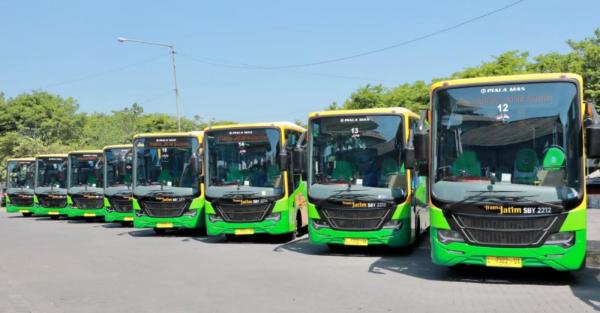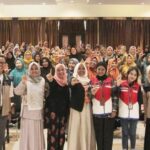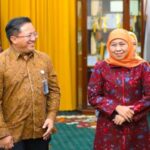SURABAYA – The East Java Provincial Government continues to improve accessibility by expanding TransJatim’s coverage. Starting October 2025, the service will extend to Lamongan and Gresik, regions that have lacked efficient public transportation.
This move goes beyond simply adding routes. According to the Head of East Java Transportation, Nyono, the expansion to Lamongan addresses the urgent need for affordable and safe transport options.
“The Lamongan route isn’t just about network growth. It represents the government’s commitment to serving underserved communities,” stated Nyono on Sunday (7/20/2025).
The new TransJatim route will pass through Lamongan’s Type B Terminal, continue through Paciran, cross Dukun Gresik, and loop back to northern Lamongan. This path strategically connects with the existing Corridor 5.
Nyono emphasized the deliberate route selection. The Transportation Department intentionally chose areas without existing transport routes to avoid conflicts with current operators.
“Using established routes would create social friction. We’re focusing on untouched areas, particularly northern Lamongan,” he explained.
TransJatim
“TransJatim” (Trans Jawa Timur) is a bus rapid transit (BRT) system in East Java, Indonesia, designed to improve public transportation across the province. Launched in 2021, it connects major cities like Surabaya, Malang, and Jember, offering affordable and efficient travel. The system reflects Indonesia’s efforts to modernize infrastructure and reduce traffic congestion in densely populated regions.
Lamongan
Lamongan is a regency in East Java, Indonesia, known for its coastal areas, cultural heritage, and religious sites. Historically, it was part of the Majapahit Kingdom and later became an important Islamic center, with landmarks like the Sunan Drajat Mosque honoring one of Java’s revered Islamic saints. Today, Lamongan attracts visitors with its beaches, such as WBL (Wisata Bahari Lamongan), and its blend of Javanese tradition and Islamic influence.
Gresik
Gresik is a historic regency in East Java, Indonesia, known for its significant role in trade and the spread of Islam in the region. Established in the 14th century, it was a major port during the Majapahit Empire and later became an important center for Islamic scholars, including the revered Sunan Gresik (Maulana Malik Ibrahim). Today, Gresik is an industrial hub but retains cultural landmarks like ancient mosques and tombs that reflect its rich heritage.
East Java Provincial Government
The East Java Provincial Government is the administrative body governing East Java, Indonesia, located in Surabaya, the province’s capital. Established after Indonesian independence, it oversees regional development, infrastructure, and public services in one of the country’s most populous and economically significant provinces. The government operates from historic and modern buildings, reflecting the region’s blend of colonial heritage and contemporary governance.
Type B Terminal
The **Type B Terminal** refers to a classification of airport terminals, often designed for handling international flights with customs and immigration facilities. These terminals are typically built to accommodate higher passenger volumes and more complex logistics compared to Type A (domestic) terminals. The concept emerged in the mid-20th century as air travel expanded globally, requiring specialized infrastructure for international travel.
Paciran
Paciran is a coastal district in Lamongan Regency, East Java, Indonesia, known for its religious and cultural significance. It is home to the revered *Sunan Drajat Mosque*, a historic Islamic site linked to Sunan Drajat, one of the nine saints (*Wali Songo*) who spread Islam in Java. The area also attracts visitors for its beaches, such as Wisata Bahari Lamongan, and its role as a center for traditional Javanese Islamic heritage.
Dukun Gresik
“Dukun Gresik” refers to the traditional healers or shamans from Gresik, a historic town in East Java, Indonesia, known for its rich cultural and spiritual heritage. These dukuns (healers) have played a significant role in Javanese society for centuries, blending indigenous animist beliefs with Islamic influences, as Gresik was an early center of Islam in Java. Today, they continue to offer spiritual guidance, herbal medicine, and rituals, preserving a unique aspect of Javanese tradition.
Corridor 5
“Corridor 5” is a term often associated with the proposed Corridor Vc, a major transportation route in Southeast Europe, part of the Pan-European Corridor V. It connects Hungary to Croatia and Bosnia and Herzegovina, aiming to improve regional connectivity and economic development. Historically, the project has faced delays due to funding challenges and environmental concerns, but it remains a key infrastructure initiative for the Western Balkans.
(If you meant a different “Corridor 5,” please provide additional context!)




